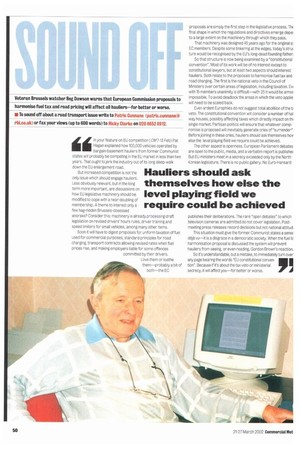— Veteran Brussels watcher Beg Dawson warns that European Commission proposals
Page 50

If you've noticed an error in this article please click here to report it so we can fix it.
to harmonise fuel tax and road pricing wM affect all hauliers—for better or worse. MI To sound off about a road transport issue write to Arlo Gunnane (patrIc.cunnane* rbi.co.uk) or fax your views (up to 600 words) to Micky Clarke on 020 8652 8912.
dd In your feature on EU competition (CM7-13 Feb) Pat
Hagan explained how 100,000 vehicles operated by
bargain-basement hauliers from former Communist states will probably be competing in the EU market in less than two years. That ought to jerk the industry out of its one sleeo-walk down the EU enlargement road.
But increased competition is ric• only issue which should engage ha. Less obviously relevant, but in the long term more important, are discussions on how EU legislative machinery should be modified to cope with a near-doubling of membership. A theme to interest only a few hag-ridden Brussels-obsessed anoraks? Consider this: machinery is already processing draft legislation on revised drivers' hours rules, driver training and speed limiters for small vehicles, among many other items.
Soon it will have to digest proposals for uniform taxation of fuel used for commercial purposes, standard principles for road charging. transport contracts allowing revised rates when fuel prices rise, and making employers liable for some offences proposals are simply the first step in the legislative process. ThE final shape in which the regulations and directives emerge depei to a large extent on the machinery through which they pass.
That machinery was designed 45 years ago for the original si EC members. Despite some tinkering at the edges, today's struc ture would be recognised by the EU's long-dead founding father So that structure is now being examined by a "constitutional convention". Most of its work will be of no interest except to constitutional lawyers, but at least two aspects should interest hauliers. Both relate to the proposals to harmonise fuel tax and road charging. The first is the national veto in the Council of Ministers over certain areas of legislation, including taxation. Evi with 15 members unanimity is difficult—with 25 it would be almos impossible. To avoid deadlock the areas in which the veto applie will need to be scaled back.
Even ardent Europhiles do not suggest total abolition of the t; veto. The constitutional convention will consider a number of hat way houses, possibly affecting taxes which directly impact on thi single market. Partisan politics will ensure that whatever compromise is proposed will inevitably generate cries of "surrender", Before joining in these cries, hauliers should ask themselves hov else the level playing field we require could be achieved.
The other aspect is openness. European Parliament debates are open to the public, media, and a verbatim report is publishec But EU ministers meet in a secrecy exceeded only by the North Korean legislature. There is no Nolt oallen,... No Euro-Hansard
publishes their deliberations. The rare "open debates" to which television cameras are admitted do not cover legislation. Postmeeting press releases record decisions but not national attitudi This situation must give the former Communist states a sense deja vu—it is a disgrace in a democratic society. When the fuel ti" harmonisation proposal is discussed the system will prevent hauliers from seeing, or even reading, Gordon Brown's reaction.
So it's understandable, but a mistake, to immediately turn over any page bearing the words "EU constitutional convention". Because if it's about the tax veto or ministerial secrecy, it will affect you—for better or worse.
























































































































































